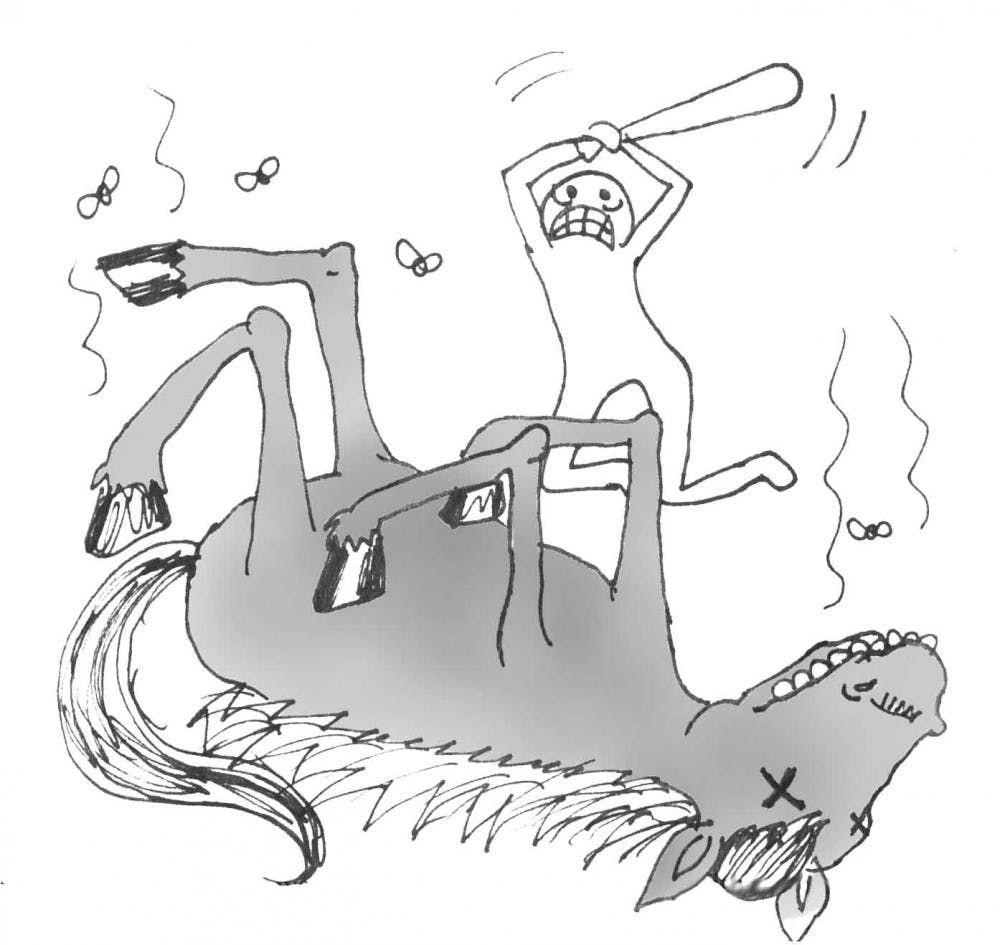By Matthew Vanderlaan, Guest Commentary
I would like to address the ongoing debate that arose concerning chivalry and whether or not it is dead. I would also like to specify that I will be dealing with heterosexual relationships throughout this opinion piece.
First and foremost, I think a definition of chivalry is necessary to understand this issue. Chivalry came in three distinct varieties during the Middle Ages. The third of which, the Chivalry of Courtly Love, seems the most relevant to the editorials, but it is important to note that there are two other kinds: Warrior Chivalry and Religious Chivalry.
By definition, Warrior Chivalry is devotion to one's lord (we'll say superior for modern convenience) which is alive and well in such institutions as the military or certain religious orders.
Religious Chivalry is seen as a dedication to God (once again, we'll generalize to a deity for modern terminology) and protection of the innocent. If there is anything that living and working on the campus of the University of Portland can teach us, it is that Religious Chivalry is one of the strongest forces in how this campus is viewed by the rest of the world and the fact that it is not only alive but flourishing can easily be seen as a positive thing.
Therefore, it appears that the arguments can be narrowed to the notion that courtly love is what has died.
Courtly love is, to be blunt, an antiquated way of interpreting romance. It started with knights selecting and being selected by women of the court in order to do knightly things in that woman's name and favor. Rarely was there an actual relationship between the knight and lady, as the lady was already married to another noble. Too often, this relationship became corrupted and the knight and lady began an affair that spiraled out of control, often resulting in the death of one or the other.
The most prominent example is Lancelot and Guinevere, who were exiled from Camelot for a relationship that escalated to an inappropriate level. I must admit, however, that courtly love included within it a notion of gentleness and graciousness to all women, which is certainly a desirable quality and one that most men I associate with seem to practice.
If anything, this antiquated notion of romance, while an idea to aspire to, has no grounds in a society where equality of gender is touted as a necessary step forward. If men are to pay for a date, they are simultaneously a prince and an oppressor. It gives the struggle for gender equality very little ground when women demand to be both pampered and acknowledged for their strength and independence. While I can't speak for other men, I often find that my gender includes a stubbornly one-track mind, and being told to balance those two desires of women is simply too much at times.
The gender split on this campus is more of a problem than first imagined: if every guy in a group of one hundred students found a single girl to take on a date, twenty two women would still be without a partner. Are men to blame for that big of a split in gender population? No, and neither are women.
It is empowering to imagine that so many women do attend college and bring back the notion of gender equality. But to complain about the lack of chivalrous men or women who desire chivalrous men is counter intuitive when all the information isn't fully known. Perhaps a poll should be drafted about relationships, determining just how many people are in a relationship and what their expectations are or would be of a partner. Assumptions get us nowhere in an issue such as this.
While each article is a valid point of view, I believe that both generalized too much about each side of the issue. Not all men simply want casual relationships and fear commitment and not all women desire a frat boy as their ideal college relationship. Each person has completely different desires when it comes to romantic interests. What is chivalry to one person is sexism to another, and what is put forth as attentiveness and devotion could be construed as being too clingy.
Before anyone makes assumptions about what people want in a relationship, maybe they should just talk about it openly and honestly. Presenting and clarifying expectations about responsibilities and behavior in a relationship is much more than healthy than assuming that your partner wants the iconic mate, whether that archetype is a positive or negative.
To be somewhat flippant, if there is anything romantic comedies have taught us, it is that the person you try to try to woo or romance is not the person with whom you fall in love. Your "true love" is the one who sees you for all your faults and imperfections, and considers them a beautiful part of who you are.
Perhaps men fear commitment because they are conditioned to do so. I think another reason certainly stands in their minds for their fear to commit: we aren't princes. Women are co-opted to be princesses waiting to be swept off their feet, but what about their reluctance or hesitation to be the objects of beauty?
I don't want a fairytale ending, whether I'm the knight or the princess; those are too grim. College may be where you meet a future spouse, but it's also about figuring out who you are and what you want in life. I can say with confidence that I don't want external expectations about how I should treat people in romantic relationships.
Matthew Vanderlaan is a senior English major. He can be contacted at vanderla11@up.edu.








